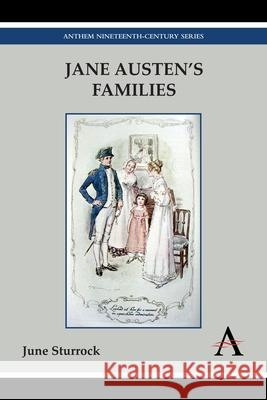Jane Austen's Families » książka
Jane Austen's Families
ISBN-13: 9781783083268 / Angielski / Miękka / 2014 / 160 str.
Jane Austen's Families
ISBN-13: 9781783083268 / Angielski / Miękka / 2014 / 160 str.
(netto: 121,50 VAT: 5%)
Najniższa cena z 30 dni: 127,31
ok. 30 dni roboczych.
Darmowa dostawa!
Jane Austen s Families discusses the fictional families such as the Bennets and the Bertrams whose dynamics are crucial both to Austen s plots and to her explorations of ethical complexities. The study focuses upon the central characters interactions with their own families and (to a lesser extent) with other family groups in an exploration of how emotional and moral development is both hindered and fostered by these interactions. Significantly, Austen chooses not to write about the orphaned heroines so often preferred by novelists of the period; rather, for a writer who cares intensely for what is natural and probable in fiction, the most common early experience of surviving the pains and pleasures of family life provides the richest material for her work. This study is historically grounded, reading Austen in the context of contemporary writing and visual culture in an exploration of her treatment of the relations between parent and child. It examines Austen s heroines as their parents daughters, responding to and resisting their upbringing, and shows how family interactions shape their courtships. Inevitably this concern involves a consideration both of the ethics of parenthood and of the ethics these heroines acquire from their parents, through adaptation, imitation and resistance to what they are taught, directly and indirectly. Interactions between parent and child affect both the daughter s experience and her active moral life."
"Jane Austens Families" focuses on family dynamics in Jane Austens six novels. After a general introduction, which places its approach in the context of ethical criticism, it divides into two sections. The first, "Family Dynamics," consists of three chapters - "The Function of the Dysfunctional Family," "Spoilt Children" and "Usefulness and Exertion." The three chapters of section two, "Fathers and Daughters," look at father-daughter relationships in "Mansfield Park," "Emma" and "Persuasion."











